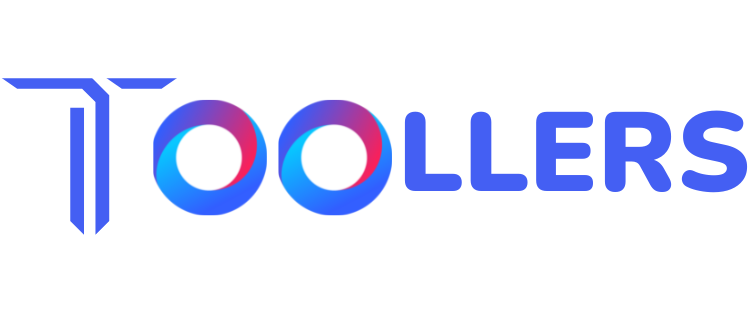In today’s digital landscape, creating high-quality content is no longer enough to stay ahead of the competition. To truly stand out, your content needs to be optimized for search engines, user engagement, and conversion. With the rapid evolution of SEO and digital marketing strategies, content optimization tools have become essential for content creators, marketers, and businesses alike.
Content optimization tools help streamline and enhance your content strategy by improving SEO, readability, and audience engagement, which ultimately leads to better conversion rates. According to recent studies, 43% of marketers say content creation is their top priority in 2025, highlighting the importance of using advanced tools for better results (Source: HubSpot).
Whether you’re a blogger, SEO professional, or digital marketer, leveraging the right content optimization software can make all the difference. In this article, we’ll explore the top 7 tools that are shaping the future of content creation and optimization.
Top 7 Content Optimization Tools in 2025
As content optimization becomes a key factor in digital marketing success, having the right tools at your disposal can make all the difference. Here’s a detailed overview of the Top 7 Content Optimization Tools , designed to help you improve SEO, enhance content quality, and boost audience engagement.

G2 Rating: Average rating on G2 based on user reviews.
Pricing: The starting price for each tool (some tools offer free trials or free versions).
Key Features: A brief list of the most notable features for each tool.
Call to Action (CTA): A clickable link to encourage readers to explore or try the tool (these links are placeholders, and you would replace them with actual URLs).
1. MarketMuse

MarketMuse is an AI-powered content research and optimization platform that helps marketers and content teams scale content creation with data-driven insights and SEO recommendations.
Features:
- AI-driven content research and topic clustering
- Content scoring based on SEO and competition
- In-depth keyword analysis and content recommendations
- AI-powered insights for precise content strategy
- Great for large teams and enterprise-level SEO
- Excellent content planning and clustering capabilities
- Higher cost, making it less suitable for small businesses
- Steep learning curve for beginners
Pricing:
- Free: $0
- Optimize: $99/Month
- Research: $249/Month
- Strategy: $499/Month
Ideal For:
Large-scale content teams, enterprise-level SEO professionals, and businesses with a significant content marketing budget.
2. Neuroflash
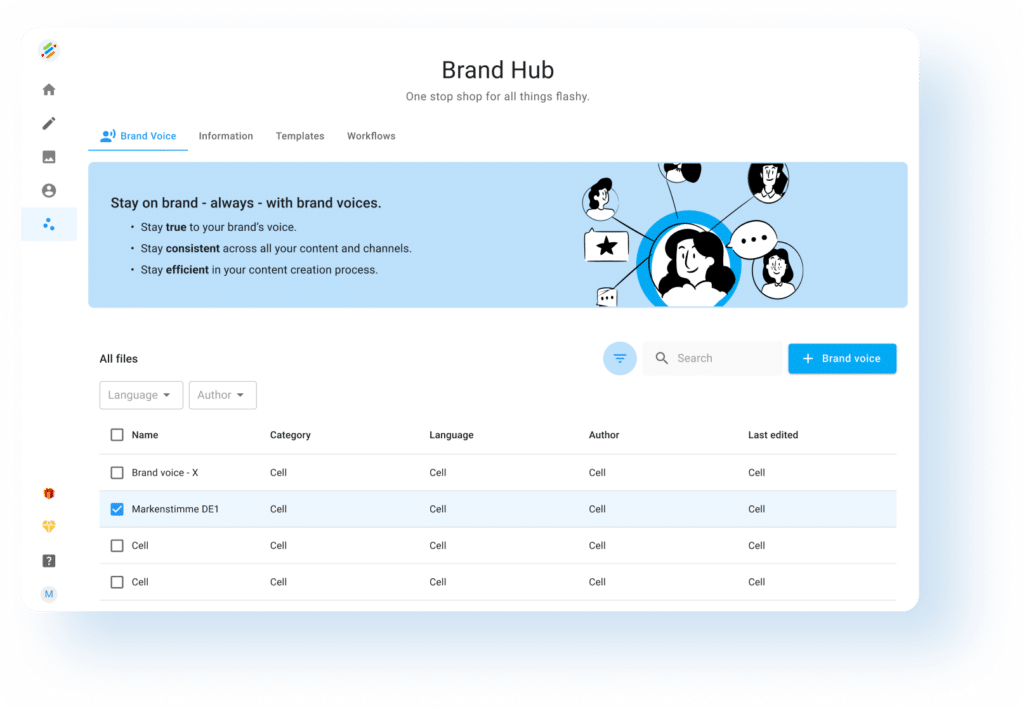
Neuroflash leverages AI to streamline content creation and optimization, making it ideal for businesses looking for quick, high-quality content solutions.
Features:
- AI-powered copywriting and content creation
- SEO insights and content optimization suggestions
- Automated content improvements based on performance
- Quick content generation with AI support
- Affordable pricing, great for small businesses
- Offers multilingual support
- Limited features in the lower-tier plans
- Not as advanced in terms of keyword research compared to other tools
Pricing:
- Free: €0
- Starter: €30/Month
- Pro: €72/Month
- Business: €300/Month
Ideal For:
Small businesses, writers, bloggers, and solopreneurs who need fast and efficient content optimization.
3. Rytr
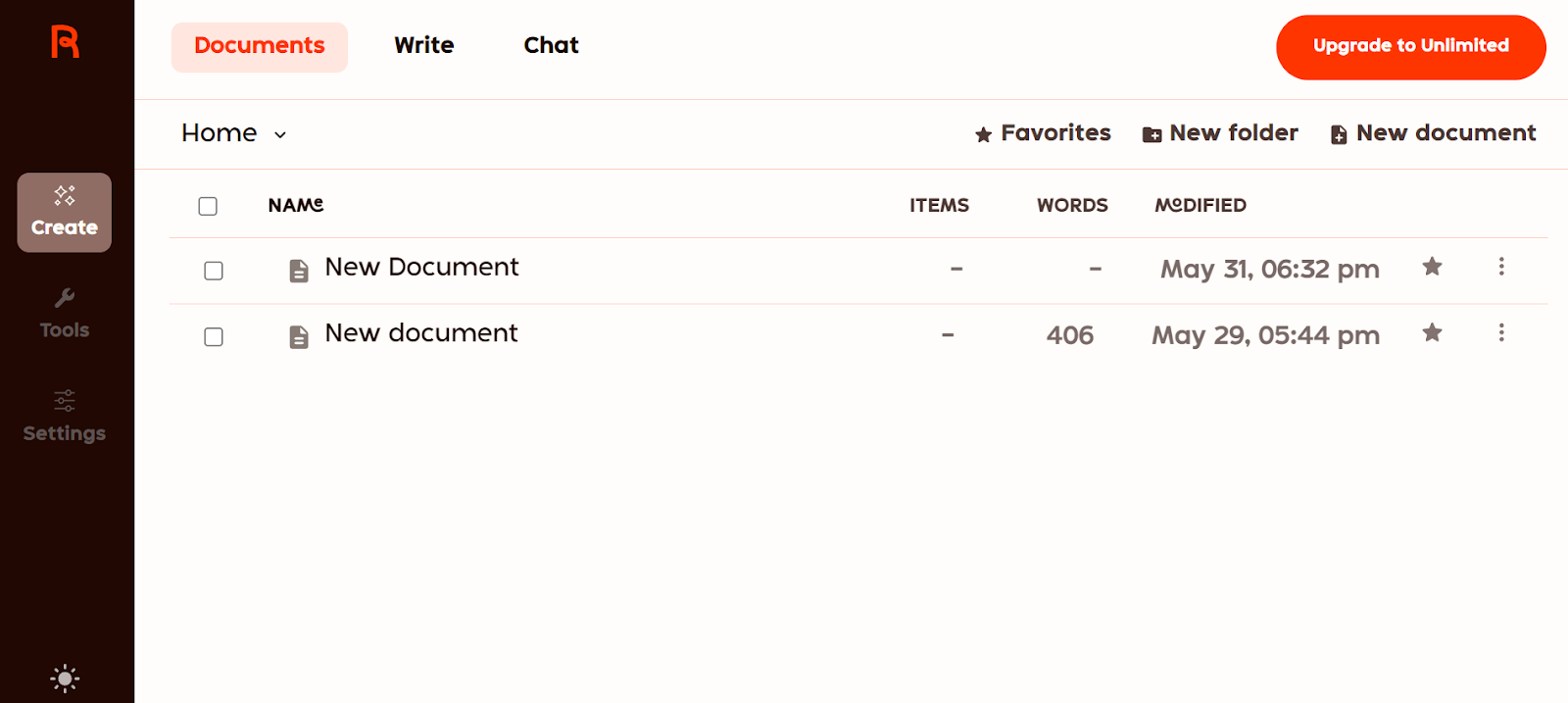
Rytr is an AI-powered writing assistant that focuses on creating high-quality content quickly, offering a range of templates and customizable writing styles.
Features:
- AI-driven content generation
- Customizable tones and writing styles
- Multi-language support
- Extremely affordable
- Easy-to-use interface, great for beginners
- Quick content generation
- Limited to shorter-form content (ideal for blog posts, social media, etc.)
- May require additional optimization for SEO-focused content
Pricing:
- Free: $0/month
- Unlimited: $9/month
- Premium: $29/month
Ideal For:
Solopreneurs, content creators, marketers, and small teams who need fast and efficient content creation.
4. Clearscope
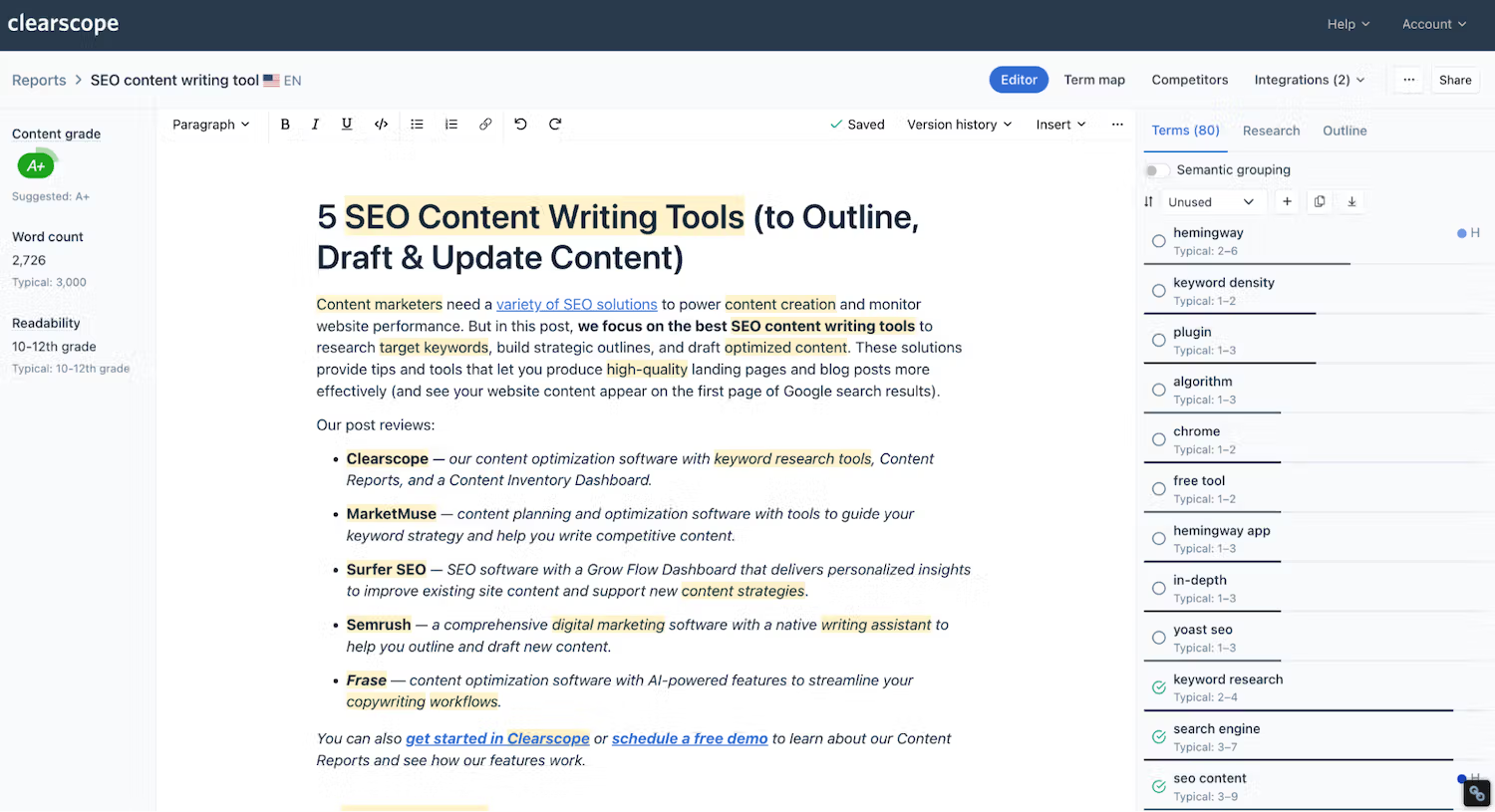
Clearscope is a content optimization tool focused on improving SEO and readability, making it especially useful for marketers and content creators looking to enhance their online presence.
Features:
- Keyword analysis and optimization
- Readability scoring and content grading
- Content scoring based on competitor analysis
- Excellent for SEO-focused content
- Detailed keyword analysis for ranking improvement
- Simple, user-friendly interface
- High cost, especially for smaller teams or businesses
- Lacks some AI-driven content creation features
Pricing:
- Essential: $189/month
- Business: $399/month
- Enterprise:Contact Sales
Ideal For:
SEO professionals, content marketers, and bloggers who want to improve content visibility and readability.
5. Frase
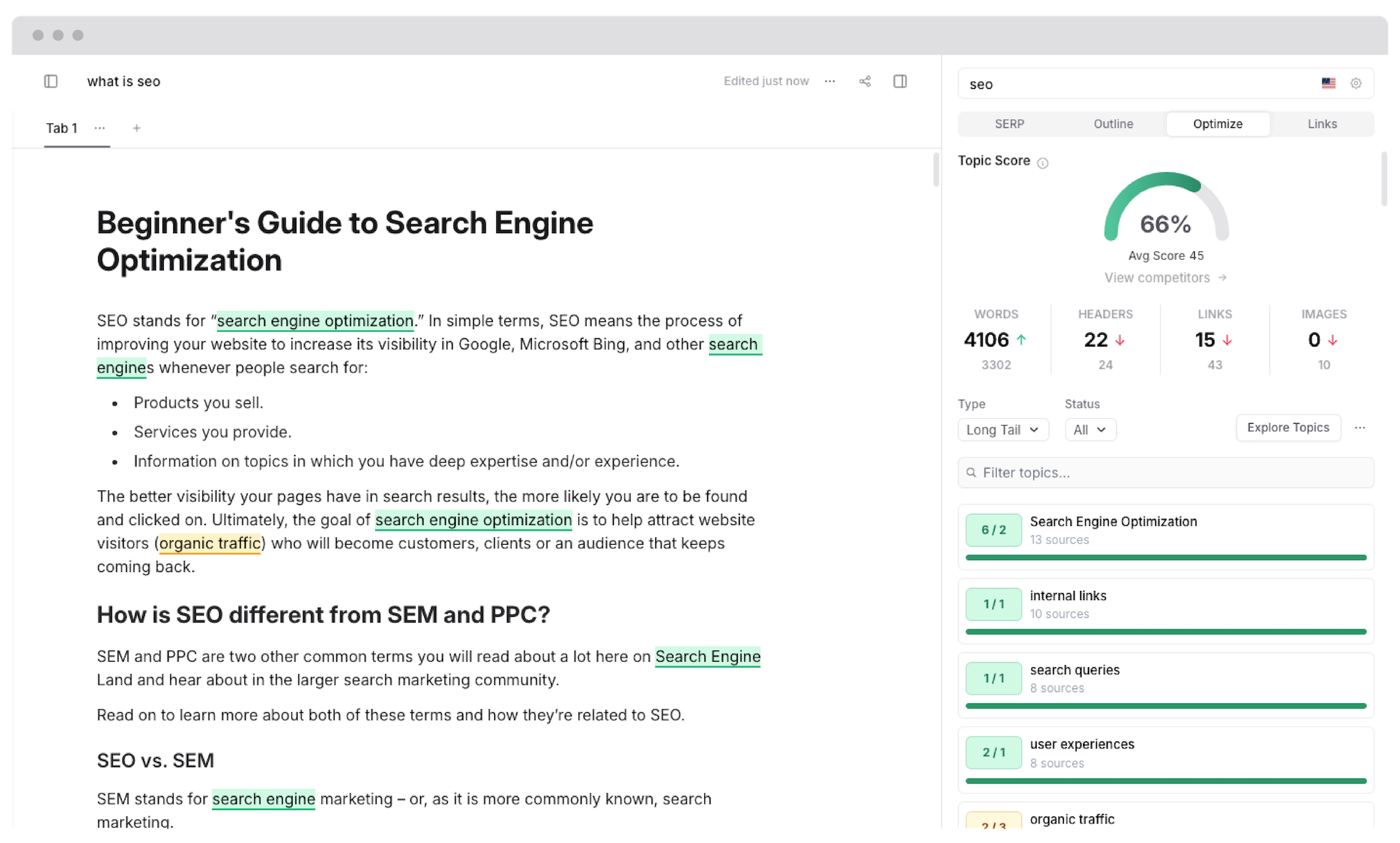
Frase combines content research, SEO optimization, and AI-driven content generation into one powerful platform. It’s an all-in-one tool for content marketers looking to streamline their workflow.
Features:
- AI-driven content creation and optimization
- SEO keyword research and ranking analysis
- Content scoring and competitor analysis
- Combines research and optimization in one tool
- Strong AI writing features for content generation
- Affordable pricing
- Lacks some advanced features for large-scale SEO projects
- Interface can be overwhelming for beginners
Pricing:
- Free Trial: $0/Month
- Basic: $45/Month
- Team:$115/Month
Ideal For:
Content marketers, SEO professionals, and digital agencies looking for an affordable, all-in-one solution.
6. Yoast SEO
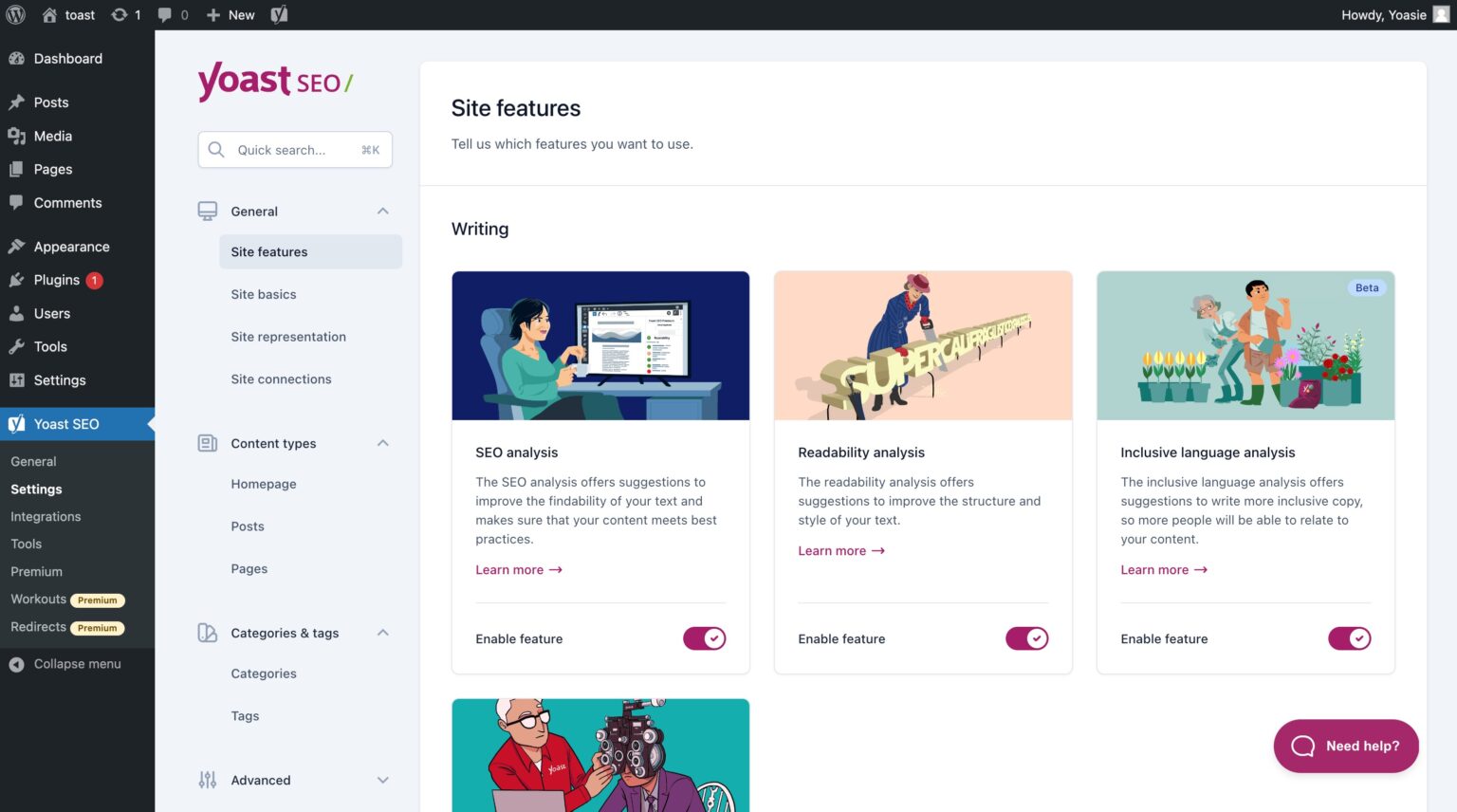
Yoast SEO is a go-to SEO plugin for WordPress, widely used for on-page SEO optimization. It simplifies SEO tasks and ensures your content is fully optimized for search engines.
Features:
- On-page SEO recommendations
- Readability checker and keyword analysis
- Internal linking suggestions
- Easy integration with WordPress
- Provides clear SEO and readability recommendations
- Free version available
- Limited features in the free version
- Some features require technical knowledge to maximize
Pricing:
- Free Trial: $0
- Premium: $99/Year
- All Plugins:$229/Year
Ideal For:
WordPress users, bloggers, and small to mid-sized businesses focused on improving their site’s SEO.
7. Grammarly
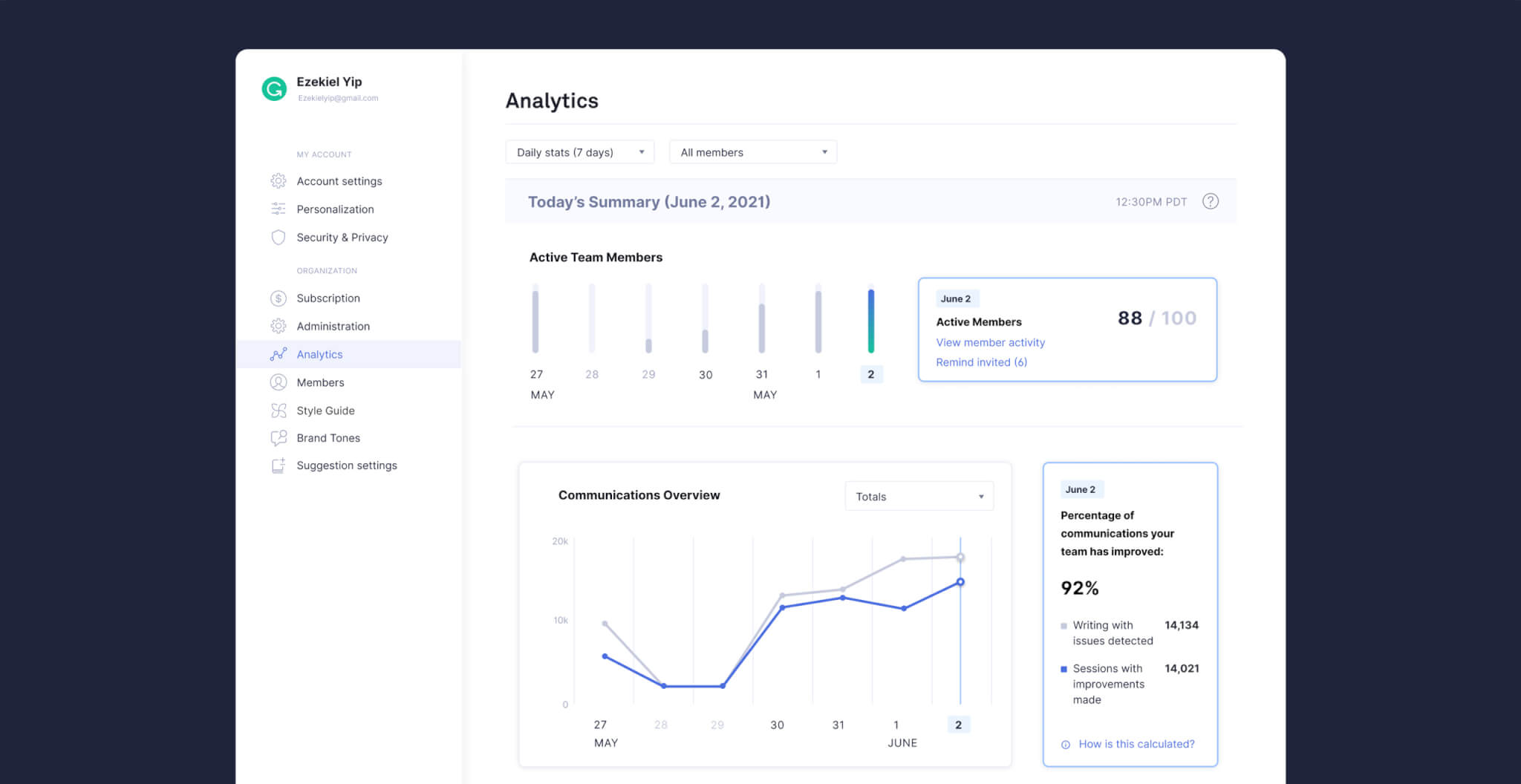
While primarily known as a grammar checker, Grammarly also provides powerful content optimization features that help ensure your writing is clear, engaging, and optimized for readability.
Features:
- Grammar checking and style suggestions
- Tone detection and readability enhancement
- Plagiarism checker (premium feature)
- Excellent for improving writing quality and clarity
- Free version available with essential features
- Highly accurate grammar and spelling checks
- Limited SEO-specific features
- Premium version can be expensive for some users
Pricing:
- Free: $0
- Pro: $12/Month
- Enterprise:Contact Sales
Ideal For:
Writers, freelancers, students, and professionals who need assistance with grammar, style, and clarity.
Who Should Use Content Optimization Tools?
Content optimization tools are beneficial for a wide range of professionals and businesses:
- Content Writers & Bloggers: These tools help improve content quality, making it more SEO-friendly and engaging for readers.
- SEO Professionals: Content optimization tools simplify keyword research, content analysis, and SEO strategies, improving overall SEO results.
- Digital Marketers & Content Teams: These tools streamline collaboration within teams and help marketers optimize content across different platforms.
- Small Business Owners & Entrepreneurs: By using content optimization tools, small businesses can enhance their content marketing efforts without hiring a full-scale team.
How We Analyzed These Content Optimization Tools
Choosing the best content optimization tools isn’t just about which ones are the most popular—it’s about selecting the tools that deliver the best results for your content strategy. To ensure our recommendations are both accurate and reliable, we followed a comprehensive evaluation process. Here’s how we did it:
1. Hands-On Testing by Our R&D Team:
Our dedicated Research and Development (R&D) team conducted rigorous testing of each content optimization tool to evaluate its real-world performance, features, and overall usability. We used these tools in various scenarios, from optimizing blog posts to refining landing pages, to gain firsthand insights into their strengths and weaknesses. This hands-on approach allowed us to assess how each tool performs in practice, and whether it truly delivers on its promises in terms of SEO, readability, and engagement.
2. External References and Reviews:
To further ensure objectivity, we analyzed feedback and ratings from trusted review platforms like G2, Capterra, and Trustpilot. These platforms provide authentic user experiences, allowing us to gather valuable insights into the tools’ performance, customer satisfaction, and any potential issues. By blending our internal testing with external perspectives, we were able to gain a more holistic view of how each tool works across different industries and user needs.
3. Evaluation Criteria:
We assessed each content optimization tool based on the following key criteria:
- Features: Does the tool offer essential content optimization capabilities, such as content research, SEO recommendations, keyword analysis, and readability scoring?
- User Experience: Is the tool user-friendly and intuitive, ensuring that both novice and experienced users can leverage its features effectively?
- Customer Support: Does the tool offer responsive customer support, tutorials, and resources to help users maximize its potential?
- Pricing: Is the tool reasonably priced, and does it provide value for money given its capabilities?
- Integration: Can the tool easily integrate with other platforms like WordPress, Google Analytics, and SEO tools to create a seamless workflow?
4. Why These 7 Tools Were Selected:
After thoroughly analyzing all the available options, we selected these 7 content optimization tools because they consistently performed well across all evaluation criteria. Each of these tools offers powerful features, user-friendly interfaces, and reliable customer support, making them stand out in 2025’s competitive content optimization landscape.
These tools are designed to meet the needs of businesses of all sizes, from small startups to large enterprises, and are future-proof solutions for enhancing content quality, SEO, and audience engagement. Whether you’re optimizing individual blog posts or executing large-scale content strategies, these tools are well-equipped to help you achieve your content marketing goals.
By combining our R&D team’s hands-on experience with feedback from trusted external sources, we’ve curated a list of the best content optimization tools that cater to a wide range of needs and budgets.
Key Features to Look for in a Content Optimization Tool
When choosing a content optimization tool, it’s essential to look for the following features:
- AI-Powered Suggestions: AI helps automate content optimization, providing recommendations based on data-driven insights.
- Keyword and Competitor Analysis: These tools analyze competitors and suggest the best keywords to target.
- Readability and Engagement Metrics: Ensuring your content is both readable and engaging is crucial for user retention.
- SEO Optimization Tools: Tools that help optimize metadata, backlinks, and on-page elements can significantly improve your content’s SEO performance.
- User Experience (UX): The tool should be intuitive and easy to use.
- Integration with Other Platforms: Check for compatibility with platforms like WordPress, Google Analytics, and other marketing tools.
 Pro Tip
Pro Tip
Leverage the integration of multiple content optimization tools for a well-rounded content strategy. For instance, use MarketMuse for deep content research and keyword analysis, while relying on Grammarly for grammatical accuracy and readability improvements. This approach can ensure high-quality, SEO-friendly, and engaging content across all stages of the content creation process.
How to Choose the Right Content Optimization Tool for Your Needs
Choosing the right tool depends on several factors:
- Budget Considerations: Tools like Yoast SEO and Grammarly offer free versions, while others, like MarketMuse and Frase, have premium pricing. Ensure you select a tool within your budget.
- Use Case Fit: Some tools work better for long-form content, while others are more suited for blogs or landing pages. Choose a tool that aligns with your content goals.
- Scalability and Team Features: If you plan to scale your content efforts, look for tools that offer team collaboration features.
- Support and Customer Service: Check if the tool offers responsive support, especially if you encounter issues.
- Free Trial vs Paid Subscription: Many tools offer free trials. Take advantage of these to see if the tool meets your needs before committing to a paid subscription.
Conclusion
Content optimization is an essential part of any content marketing strategy in 2025. The tools discussed in this article—such as MarketMuse, Neuroflash, and Yoast SEO—offer powerful features that can help improve SEO, readability, engagement, and conversion rates. As you explore these tools, take advantage of free trials to see which one fits your specific needs best. Start optimizing today to stay ahead of the competition in the ever-evolving world of content marketing.
 Expert Advice
Expert Advice
Experiment with different content optimization tools based on your specific needs. If you're focused on content generation and speed, consider using tools like Rytr or Neuroflash. For in-depth SEO analysis and content scoring, Clearscope and Frase provide powerful insights. Always tailor the tool choice to your team’s size, goals, and budget to maximize ROI.
FAQs
1. What is the most effective content optimization tool in 2025?
MarketMuse and Neuroflash lead the way due to their AI-driven capabilities and data-driven insights.
2. How do content optimization tools improve SEO?
These tools help optimize keywords, ensure your content is SEO-friendly, and offer suggestions for better keyword targeting.
3. Are there any free content optimization tools?
Yoast SEO and Grammarly offer free versions with basic features that can help optimize content effectively.
4. Which tool is best for beginners?
Grammarly and Yoast SEO are great starting points for beginners due to their user-friendly interfaces and foundational features.
